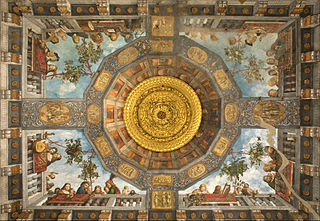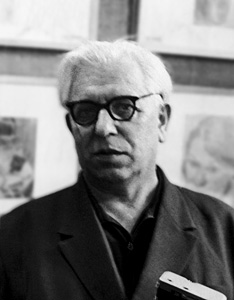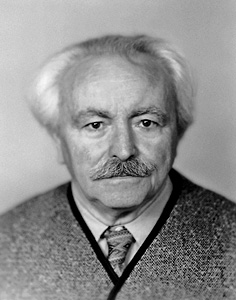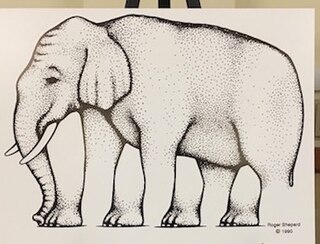Elena Moskaleva (born 12 November 1957 in Krasnoarmeysk, Moscow Oblast) is a Russian visual artist specialising in optical illusions.
Elena Moskaleva (born 12 November 1957 in Krasnoarmeysk, Moscow Oblast) is a Russian visual artist specialising in optical illusions.
Elena Moskaleva has studied art from early childhood: first in an art school in her hometown, and later in Moscow Academic College of Fine Art as a pupil of Matilda Bulgakova. After graduating in 1978 Elena began her work as a painter.
Elena is a member of the Moscow Artist Union [1] from 1998 and International Federation of Artists (IFA) UNESCO.
She is a regular participant of major exhibitions in Moscow and her paintings were featured on exhibitions worldwide, most notably in Davos in the 1990. [1]
Elena Moskaleva is one of the rare Russian artists working in the genre of optical illusion. Her paintings have been featured in a number of notable albums dedicated to optical illusions in fine art, along with such artists as Octavio Ocampo (Mexico), Michael Cheval (USA), Oleg Shuplyak (Ukraine) Rafal Olbinski (Poland), Liu Bolin (China), István Orosz (Hungary). [2]
Most optical illusions are weaved into classical fine art genres such as landscapes. Critics have noted that these double images are well-hidden: "She loves producing lovely artworks that come in pastel colors. Let’s see if your eyes are sharp enough to spot the hidden portraits in this painting." [3] The paintings are also cleverly detailed: "Elena is the kind of artist who can play well with details. This is definitely not just a simple landscape painting." [4] Gabriel Todica notes that Elena Moskaleva draws inspiration from nature and constructs "a surreal, warm and idyllic imagery". [1]
Elena Moskaleva's works are featured in several museums as well as in private collections of Brian Eno, Amjad Ali Khan, Eduard Sagalaev, Ted Hartley and Dina Merrill. [5]
An impossible object is a type of optical illusion that consists of a two-dimensional figure which is instantly and naturally understood by the retina as representing a projection of a three-dimensional object.

Trompe-l'œil is an art technique that uses realistic imagery to create the optical illusion that the depicted objects exist in three dimensions. Forced perspective is a comparable illusion in architecture.
Elena Mikhailovna Kostenko was a Soviet Russian painter, living and working in Saint Petersburg, a member of the Saint Petersburg Union of Artists, regarded as one of the major representatives of the Leningrad school of painting, most famous for her portrait paintings.

Vladimir Alexandrovich Gorb was a Soviet Russian painter, graphic artist, and art teacher. He lived and worked in Leningrad as professor of the Repin Institute of Arts, was awarded the title of Honored Art Worker of Russian Federation, and was member of the Leningrad branch of Union of Artists of Russian Federation. He is regarded as a representative of the Leningrad school of painting, most famous for his portrait paintings and Art teaching.

Mikhail Davidovich Natarevich was a Soviet, Russian painter who lived and worked in Leningrad; he was a member of the Leningrad Union of Artists, and was regarded as one of the brightest representatives of the Leningrad School of Painting.

Nadezhda Pavlovna Shteinmiller was a Russian Soviet realist painter, graphic artist, art teacher, scenographer, and stage designer who lived and worked in Leningrad. She was a member of the Leningrad Union of Artists, regarded as one of the leading representatives of the Leningrad School of Painting.
Zlata Nikolaevna Bizova was a Russian Soviet realist painter and graphic artist, who lived and worked in Saint Petersburg. She was a member of the Saint Petersburg Union of Artists and is regarded as one of representatives of the Leningrad school of painting.
The year 1957 was marked by many events that left an imprint on the history of Soviet and Russian fine arts.
The year 1956 was marked by many events that left an imprint on the history of Soviet and Russian Fine Arts.
The year 1958 was marked by many events that left an imprint on the history of Soviet and Russian Fine Arts.
The year 1960 was marked by many events that left an imprint on the history of Soviet and Russian Fine Arts.
The year 1961 was marked by many events that left an imprint on the history of Soviet and Russian Fine Arts.
Alma Redlinger was a painter and illustrator from Romania.
The year 1962 was marked by many events that left an imprint on the history of Soviet and Russian Fine Arts.
The year 1965 was marked by many events that left an imprint on the history of Soviet and Russian Fine Arts.

Tamara Nina Arbore was a Romanian painter and illustrator, known for her still-lifes and portraits.

Nicolae Orval Gropeanu or, in French, Nicolas Gropeano was a Romanian painter, pastelist and illustrator; probably of Jewish ancestry. He is known primarily for genre scenes, portraits and figures. Other variations on his name as it appears in official documents include Nicolae Gropper, Naia Groper and Noah Gropper.

The Shepard elephant, also known as L'egs-istential Quandary or the impossible elephant is an optical illusion, of the type impossible object, based on figure-ground confusion. As its creator Roger Shepard explains:
The elephant…belongs to a class of objects that are truly impossible in that the object itself cannot be globally segregated from the nonobject or background. Parts of the object become the background, and vice versa.

Elena Murariu is a Romanian painter and iconographer. She is known for her icons and graphics works.
Tamiji Kitagawa was a Japanese painter, printmaker and art educator.